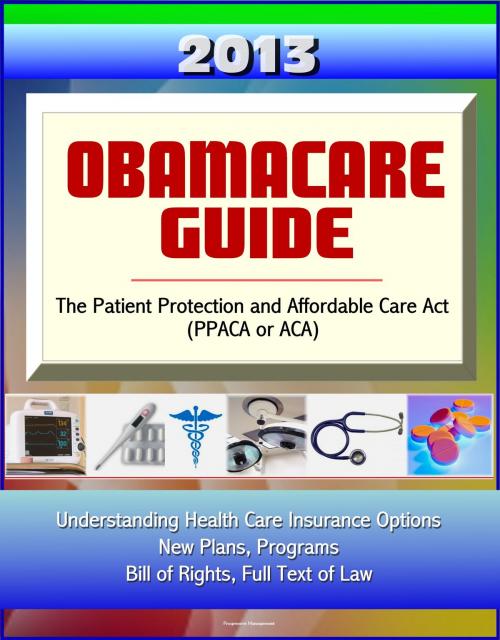2013 Obamacare Guide - The Patient Protection and Affordable Care Act (PPACA or ACA) - Understanding Health Care Insurance Options, New Plans, Programs, Bill of Rights, Full Text of Law
Business & Finance, Industries & Professions, Insurance| Author: | Progressive Management | ISBN: | 9781301032723 |
| Publisher: | Progressive Management | Publication: | April 6, 2013 |
| Imprint: | Smashwords Edition | Language: | English |
| Author: | Progressive Management |
| ISBN: | 9781301032723 |
| Publisher: | Progressive Management |
| Publication: | April 6, 2013 |
| Imprint: | Smashwords Edition |
| Language: | English |
This important and authoritative e-book, updated for 2013, provides a complete guide to the Patient Protection and Affordable Care Act (PPACA), signed by President Barack Obama in March 2010, with the equivalent of over 1500 pages of material.
There is coverage of all facets of this vital new law, with full reproductions of implementing regulations and language; top things to know; improvements available now and in the near future, as well as by 2014; patient bill of rights; small employer tax credits; Medicare donut hole rebate; pre-existing condition plans and high-risk pools; parents coverage for children up to age 26; Medicaid and subsidies; Office of Consumer Information and Insurance Oversight (OCIIO); health disparities and preventive care coverage; information technology and electronic medical records (electronic health records, EHR); community health centers; insurance options for individuals, families with children, people with disabilities, young adults, and employers; the full text of the law; regulations; authorities; implementation plans; CHIP and programs for children; information about long-term care; and much more. President Obama signed into law the Affordable Care Act. The law puts into place comprehensive health insurance reforms that will hold insurance companies more accountable and will lower health care costs, guarantee more health care choices, and enhance the quality of health care of all Americans. The Act will not be implemented all at once. Portions of the law have already taken effect. Other changes will be implemented through 2014 and beyond. Here's what the government says about the options in the law: The Affordable Care Act is giving you more control over your family s health care by expanding your options for health insurance and making them more affordable. Starting as early as 2010, job-based health plans and new individual plans won t be allowed to deny or exclude coverage for your children (under age 19) based on a pre-existing condition including a disability. Starting in 2014, these same plans won't be allowed to deny or exclude anyone or charge more for a pre-existing condition including a disability. Starting as early as September 2010, if you have children under age 26, you can generally insure them if your policy allows for dependent coverage. The only exception is if you have an existing job-based plan, and your children can get their own job-based coverage. In some plans, you can add your young adult children even earlier than September 2010. Starting as early as 2010, insurance companies won t be able to drop you when you get sick just because you made a mistake on your coverage application. Starting in 2014, if your income is less than the equivalent of about $88,000 for a family of four today, and your job doesn't offer affordable coverage, you may get tax credits to help pay for insurance. Starting in 2014, pregnancy and newborn care, along with vision and dental coverage for children, will be covered in all Exchange plans and new plans sold to individuals and small businesses. An Exchange is a new marketplace where individuals and small businesses can buy affordable health benefit plans. Exchanges will offer you a choice of plans that meet certain benefits and cost standards. Starting in 2014, Members of Congress will be getting their health care insurance through Exchanges, and you will be able buy your insurance through Exchanges, too.
This important and authoritative e-book, updated for 2013, provides a complete guide to the Patient Protection and Affordable Care Act (PPACA), signed by President Barack Obama in March 2010, with the equivalent of over 1500 pages of material.
There is coverage of all facets of this vital new law, with full reproductions of implementing regulations and language; top things to know; improvements available now and in the near future, as well as by 2014; patient bill of rights; small employer tax credits; Medicare donut hole rebate; pre-existing condition plans and high-risk pools; parents coverage for children up to age 26; Medicaid and subsidies; Office of Consumer Information and Insurance Oversight (OCIIO); health disparities and preventive care coverage; information technology and electronic medical records (electronic health records, EHR); community health centers; insurance options for individuals, families with children, people with disabilities, young adults, and employers; the full text of the law; regulations; authorities; implementation plans; CHIP and programs for children; information about long-term care; and much more. President Obama signed into law the Affordable Care Act. The law puts into place comprehensive health insurance reforms that will hold insurance companies more accountable and will lower health care costs, guarantee more health care choices, and enhance the quality of health care of all Americans. The Act will not be implemented all at once. Portions of the law have already taken effect. Other changes will be implemented through 2014 and beyond. Here's what the government says about the options in the law: The Affordable Care Act is giving you more control over your family s health care by expanding your options for health insurance and making them more affordable. Starting as early as 2010, job-based health plans and new individual plans won t be allowed to deny or exclude coverage for your children (under age 19) based on a pre-existing condition including a disability. Starting in 2014, these same plans won't be allowed to deny or exclude anyone or charge more for a pre-existing condition including a disability. Starting as early as September 2010, if you have children under age 26, you can generally insure them if your policy allows for dependent coverage. The only exception is if you have an existing job-based plan, and your children can get their own job-based coverage. In some plans, you can add your young adult children even earlier than September 2010. Starting as early as 2010, insurance companies won t be able to drop you when you get sick just because you made a mistake on your coverage application. Starting in 2014, if your income is less than the equivalent of about $88,000 for a family of four today, and your job doesn't offer affordable coverage, you may get tax credits to help pay for insurance. Starting in 2014, pregnancy and newborn care, along with vision and dental coverage for children, will be covered in all Exchange plans and new plans sold to individuals and small businesses. An Exchange is a new marketplace where individuals and small businesses can buy affordable health benefit plans. Exchanges will offer you a choice of plans that meet certain benefits and cost standards. Starting in 2014, Members of Congress will be getting their health care insurance through Exchanges, and you will be able buy your insurance through Exchanges, too.















